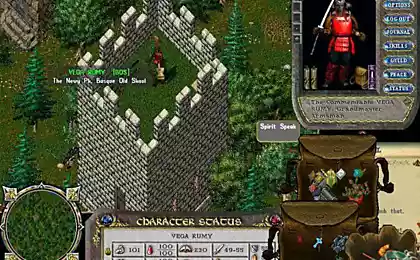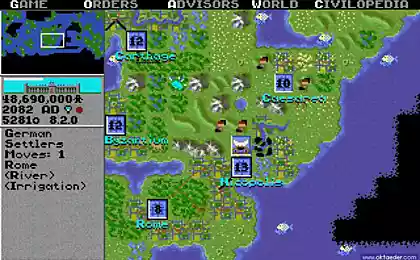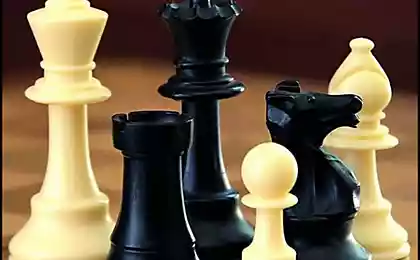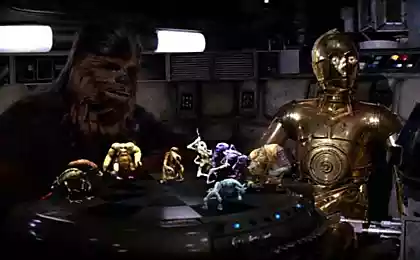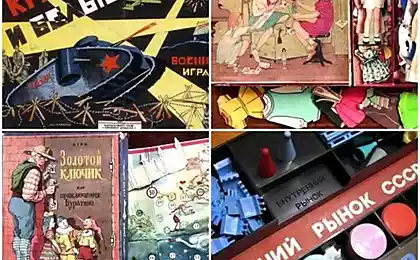882
Find out which games are RIGHT for Your child — it's phenomenal!
Children's play has huge value for development. The more the child plays, the higher its ability to explore, reveal, internally, to grow and enjoy the world. What is the meaning of child play, do we know how to understand and support her? – Tells the teacher and the psychologist co-working "Building Gnome" Irina Belyaeva.
The value of the games
Games surround us everywhere; the game is not only a mess in a plastic bucket, the game is politics and fun, sub-cultural traditions and religious rituals, theatrical performances and behavior in business meetings, football games and scientific discoveries. Play adults, children and even animals. The dog running after the ball, dolphins jumping out of the water, bears in a serious sparring all exhibit play behavior.
But only in human civilization game has such a universal significance, and maybe that's why bears dolphins still don't build stadiums.
In XIX century it was believed that the game is what distinguishes man from other creatures. Modern ethologists know that animals play behaviour is extremely important.
For example, playing the mountain goats, leaping upon the mountains cause them harm, risk to fall from a height. However, the researchers found, these seemingly stupid goats that leap on the dangerous serpentine road, you eventually become smarter than their comrades, deprived of such opportunities. Playing goats successfully adapt to life: leave more healthy offspring and find their best food.

Psychiatrist, clinical researcher Stuart brown once said about studies conducted on mice. One group of rodents made it impossible to play, while the other developed normally. After mice scare the cat smell, scientists watched their reactions. First, both groups huddled in a corner, but then the animals who spent his early years in the games, went cautiously to explore the area, sniffing the corners. Another group, which was not a playful mouse, and left to sit in the corner.
The scientists ' conclusion is that play behavior is a vital necessity, it helps to adapt to any conditions.
Game and brain
While your child rushes and, in the opinion of his grandfather, meaningless buzzing train, his brain is changed physically. No letter cubes can not give the desired effect, a "locomotive horn" has neurosystem person. The game stimulates the growth of cells in the amygdala – area responsible for emotional control. (By the way, is that her disorders are associated with autism and anxiety.) The game affects the dorsolateral cortex of the brain, and that is responsible for decision-making, the distribution of information.
Neuroscientists are ready to swear that "cops and robbers" in which you drove in my childhood, had a significant impact on your cognitive abilities. Maybe even more than the arithmetic lessons in the third grade.
In addition, the game allows you to test yourself, try new experiences, develop self-control, to live the flow state is a special state of concentration, which gives a lot of energy.
What distinguishes the game
The teacher comes to the children and said: "and let's play!" And the kids in unison: "nope, don't want to!" They don't want, because I know that right now the teacher will be happy to smile, happy to jump, and then try to push them into something unnecessary. (Maybe it's necessary, but unlikely – if it forcibly cram under the guise of the game).
The real game has such features:
A game for the ages
Division by age is rather arbitrary and does not mean that only one only way to play in 2 or 3 years. For example, a manipulative game appears during embryonic development (Yes, they have very exciting things like umbilical cord and amniotic SAC) and continues to the end of life, until the umbilical cord is slowly replaced by the smartphone and then the device, marasim pressure.
1. Manipulative game (with 3-4 months. embryonic development)
For a child up to six years is the most important activity is to throw, roll, hide, find, edit, form, poshurshat, to ring, to scatter. Experiments with flying oatmeal can sometimes upset adults, but they must be present in the baby's life. If a person throws a utensil needs to be naprositsya satiate your interest. But if you are ready to scream every time "happiness!", buy not so fragile plates.
2. Symbolic play (with 1.5–1.8 g)
This kind of game begins when the child can give the object a new function: a piece of bread becomes a crown, a stick doll, chair machine.
Symbolic thinking is the basis of imagination and sense of humor. So when you are going to meet a locomotive with sausage, send them across to another engine – out forks. It is the creation of so-called imaginary situation in which the imagination is working at full power.
3. Roleplay (2-3 years)
Here is not the subject, and the child tries on the images: fulfills social roles, turning into a kitten or a dinosaur. By what the role chooses the kid, you can find out what are its strengths and weaknesses. For example, the anxious child will choose a more aggressive role: I grab the grenade launcher, because not sure of the situation in advance and needs to scare everybody.
The literature describes cases, when the sisters of life offer each other: "let's play that we are sisters!" The real trick here: by playing, they try to realize their ideal views of the sisters. If you can sister tugging on the ear, in the game you play hands and Pat each other on braids. Parents will be easy to implement with the child a perfect model of mother and baby ("let's play like you're my mother!"), rock it in my arms, kissing the top of my head.
Roleplay is good for the perception of new situations: if a family will travel, move, or potty training, before these developments have some time to play a trip, moving or potty training. Information is the child has, and he will be able to digest it in everyday life.
Roleplay will accompany us all life, and the better we negresa in her childhood, the better we will be able to depict the waking of the employee at the meeting.
4. Role-play (3-4 years)
At this stage, the player is not just role with it all the time something happens; it's not just a pirate, waving a sword, is a pirate who boarded a ship, sailed to sea, where he was attacked by sharks, and even a ship has a broken mast... role-playing game is lived emotionally, it is very important to find your style of behavior and develop event outline. Modern children are usually very bad at role-play games, because in 3-4 years we suddenly begin to teach them, enter a busy schedule of classes and show letters. If you go in the game to the store and put them to bed dolls no problem, then develop the story of the loss of money in the supermarket may be a rare child.
It may be advisable to play by, drive to where I can and love to play, read books, walk with family in theaters...
5. Directing the game (4-5 years old)
It's aerobatics, this game can last a very long time – for months, there are many stories, and it takes various forms. Compose day-to-day stories for lost world, playing all summer with friends in Robin hood, with a tree house, to create a comic series about a traveling circus – all kinds of directing the game.
Able to create and maintain this game, the child not only develops thinking and speech, but also gaining a leadership position among peers who have not yet learned to play the military dictatorship of the African tribe "Tumma".
Game frightening parents

Most of the unrest in adults cause children's games involving sex and death.
Doctor, show body parts and hugging and "mommy and daddy" makes parents nervous, and completely in vain. Children's interest in heterosexuality, to body, to relationships is normal. Sex is in our lives, and knowledge about it a child in any case acquire. It is important to decide whether we take on this parental function – to explain to children about sex, or we push it away in the hope that the best kid will tell about it in a random video on the Internet. The fact that the child had a game with sexual overtones, says only one thing – time to talk about this. But hidden behind seven of the mezzanine of the book "How I was brought by the stork" will only warm up to the forbidden topic of interest.
Game sickness, death and funerals, too, are judgment disturbing information. If we are working hard to hide the fact that grandfather not left for a business trip, the child scares our silence more than it would the truth. The only thing that you should consider, as that's about it.
But that is not a game and should alert parents is bullying and computer games. Bullying (harassment) is not just an irritation, this irritation, exceeding the strength of the child, the situation from which he cannot voluntarily leave. Themselves teasers – things useful. It is human nature to tease others, her beloved husband, best friend, and the children verbal aggression is actually a step forward compared to physical aggression. Clever in teasing the person can no fists to fight for ourselves on the Playground. In contrast to the situation of bullying, just playing teasers, kids feel, where is the line for which you'll use, not to hurt the other.
A computer game is not a game, because while the child is sitting in front of the screen, with himself, nothing happens, it does not learn new things about yourself, test the limits of endurance. It does not internally change.
Separate line: Board games
Board games are good because usually they merge the interests of children and parents, they genuinely are the easiest to get involved in the whole family. The gaming enthusiasm is contagious.
If in 2 years we support and use the most basic of the game, then five or six years we will be people able to compete in complex strategic games like "Colonizers".
Surprising fact: a 35-minute lesson in first grade, the child has to sit forcibly, while two hours in the same uncomfortable position at the table before the game, he holds easily and at the same time focused. It's a huge exercise of self-control and self-discipline. Man voluntarily gets behind the game adopts its rules and tackles the tough issues, while experiencing not only joy, but also sorrow and disappointment.
The pitfalls of the game
We will focus on the subtle things you need to remember during the game that she brought joy to all participants.
1. The wins and losses
Here parents often spoil the whole raspberries, or flattering, or, conversely, not allowing the child to win. To give in is impossible, the game needs to be a drive, but you can set up special rules, to give odds. "You have to eat three frogs, and me for six". 4-5 years your child it is important to learn to lose, because then peers will not succumb or to sprinkle ashes on his head, when something goes wrong. Losing is also a valuable experience. And especially easy to survive if the parent also shows his reaction: genuinely upset, purging, or from the heart is happy, gaining points.
2. Competitive moment
This point is often used for manipulation: "well, who is faster out of the laces and wash the dishes?!" Psychologists do not advise to feed once again the competitive spirit in life and without enough competition and tension.
3. Too many toys
A common problem which is rather difficult to understand parents. Toys which occupy three rack, is toys that the child can not subdue. It's like they took the victory. But the child must be a master of their possessions. But his game does not have enough energy for the conquest of Siberia and the Far East. The problem is easily solved by the reduction of the number of robots and tractors.
4. Hidden targets
If under the guise of the game in the sailors you are trying to teach the daughter the Morse code, there's nothing wrong, but we should be honest to admit that you are not playing, and doing training. The game is easy to fool kids, but it's important not to fool ourselves: we're not playing snake, and wear man tights without hysteria.
5. The lack of motivation from some of the players
The mother, who, yawning, asked if the whites during the battle to wash the dishes – a very dreary spectacle. The mother, who is said to play a very cool and interesting, and then escapes from the prison to answer the phone obviously disingenuous. If you can't swing on vines, call someone from friends who can teach your kids to play poker and will be sincere and gambling.
How to return the game to your life
The secret is that playing by themselves adults are much more motivated by the child than the mother who helplessly puts one cube to another.
So when you stop biting yourself for failure in the game with "Cute ponies", think that is your personal game? You may like to lash out at the baby and tickle him, jump over cracks in the pavement on one foot, sing camp songs, make it rhyme or to let on the river boats – is not so important what you're playing.
We just need to share my gaming as a child, to give him this feeling of joy and flight. When he realizes how great it is, it will have a chance to find your own game.
The game can lurk in the details, be frivolous, allow yourself to fool around, rustling dry leaves and read the signs with a stupid accent, cook the soup, if doing the magic potion, but give yourself the right to be wrong, seek and do not be afraid!
And if you're not in the mood, allow yourself not to play. You can always invite people who play to visit, or just to welcome a child's game.
Rules family game:
References: Johan Huizinga "Homo ludens", Moscow: Progress-Traditsiya, 1997
Stuart brown, Christopher Vaughan "Play", M: MYTH, 2015
Cziksentmihalyi Mihai "flow: the Psychology of optimal experience", Moscow. Alpina non-fiction, 2011.
Hg wells "Game on sex", MOSCOW-PETROGRAD, 1923
Vygotsky L. S. collected works: In 6 T. M.: Longman, 1983.
P. S. And remember, just changing your mind — together we change the world! © Join us at Facebook , Vkontakte, Odnoklassniki
Source: letidor.ru/article/kak-i-zachem-igrat-s-detmi_186603/
The value of the games
Games surround us everywhere; the game is not only a mess in a plastic bucket, the game is politics and fun, sub-cultural traditions and religious rituals, theatrical performances and behavior in business meetings, football games and scientific discoveries. Play adults, children and even animals. The dog running after the ball, dolphins jumping out of the water, bears in a serious sparring all exhibit play behavior.
But only in human civilization game has such a universal significance, and maybe that's why bears dolphins still don't build stadiums.
In XIX century it was believed that the game is what distinguishes man from other creatures. Modern ethologists know that animals play behaviour is extremely important.
For example, playing the mountain goats, leaping upon the mountains cause them harm, risk to fall from a height. However, the researchers found, these seemingly stupid goats that leap on the dangerous serpentine road, you eventually become smarter than their comrades, deprived of such opportunities. Playing goats successfully adapt to life: leave more healthy offspring and find their best food.

Psychiatrist, clinical researcher Stuart brown once said about studies conducted on mice. One group of rodents made it impossible to play, while the other developed normally. After mice scare the cat smell, scientists watched their reactions. First, both groups huddled in a corner, but then the animals who spent his early years in the games, went cautiously to explore the area, sniffing the corners. Another group, which was not a playful mouse, and left to sit in the corner.
The scientists ' conclusion is that play behavior is a vital necessity, it helps to adapt to any conditions.
Game and brain
While your child rushes and, in the opinion of his grandfather, meaningless buzzing train, his brain is changed physically. No letter cubes can not give the desired effect, a "locomotive horn" has neurosystem person. The game stimulates the growth of cells in the amygdala – area responsible for emotional control. (By the way, is that her disorders are associated with autism and anxiety.) The game affects the dorsolateral cortex of the brain, and that is responsible for decision-making, the distribution of information.
Neuroscientists are ready to swear that "cops and robbers" in which you drove in my childhood, had a significant impact on your cognitive abilities. Maybe even more than the arithmetic lessons in the third grade.
In addition, the game allows you to test yourself, try new experiences, develop self-control, to live the flow state is a special state of concentration, which gives a lot of energy.
What distinguishes the game
The teacher comes to the children and said: "and let's play!" And the kids in unison: "nope, don't want to!" They don't want, because I know that right now the teacher will be happy to smile, happy to jump, and then try to push them into something unnecessary. (Maybe it's necessary, but unlikely – if it forcibly cram under the guise of the game).
The real game has such features:
- The apparent aimlessness, the process for the process. When an adult joy makes the wheel a few times, not in order to show what it looks like a letter X on the side.
- Voluntary. If someone of the participants makes himself pretend there is sand, this is not a game, and torture.
- An integral appeal. Game attracts game, looks intriguing, for it is not a pity to sacrifice and Wallpaper.
- Freedom from time. Just sat down after Breakfast to play, but somehow it got dark.
- The weakening of identity. Hot and pregnant do show the boa, quite forgetting that pregnant Boas is not your strong suit.
- The potential for improvisation. Oh no, not this! Pregnant boa sang an Aria.
- The desire to continue. Despite the knock of the neighbours in the battery.
A game for the ages
Division by age is rather arbitrary and does not mean that only one only way to play in 2 or 3 years. For example, a manipulative game appears during embryonic development (Yes, they have very exciting things like umbilical cord and amniotic SAC) and continues to the end of life, until the umbilical cord is slowly replaced by the smartphone and then the device, marasim pressure.
1. Manipulative game (with 3-4 months. embryonic development)
For a child up to six years is the most important activity is to throw, roll, hide, find, edit, form, poshurshat, to ring, to scatter. Experiments with flying oatmeal can sometimes upset adults, but they must be present in the baby's life. If a person throws a utensil needs to be naprositsya satiate your interest. But if you are ready to scream every time "happiness!", buy not so fragile plates.
2. Symbolic play (with 1.5–1.8 g)
This kind of game begins when the child can give the object a new function: a piece of bread becomes a crown, a stick doll, chair machine.
Symbolic thinking is the basis of imagination and sense of humor. So when you are going to meet a locomotive with sausage, send them across to another engine – out forks. It is the creation of so-called imaginary situation in which the imagination is working at full power.
3. Roleplay (2-3 years)
Here is not the subject, and the child tries on the images: fulfills social roles, turning into a kitten or a dinosaur. By what the role chooses the kid, you can find out what are its strengths and weaknesses. For example, the anxious child will choose a more aggressive role: I grab the grenade launcher, because not sure of the situation in advance and needs to scare everybody.
The literature describes cases, when the sisters of life offer each other: "let's play that we are sisters!" The real trick here: by playing, they try to realize their ideal views of the sisters. If you can sister tugging on the ear, in the game you play hands and Pat each other on braids. Parents will be easy to implement with the child a perfect model of mother and baby ("let's play like you're my mother!"), rock it in my arms, kissing the top of my head.
Roleplay is good for the perception of new situations: if a family will travel, move, or potty training, before these developments have some time to play a trip, moving or potty training. Information is the child has, and he will be able to digest it in everyday life.
Roleplay will accompany us all life, and the better we negresa in her childhood, the better we will be able to depict the waking of the employee at the meeting.
4. Role-play (3-4 years)
At this stage, the player is not just role with it all the time something happens; it's not just a pirate, waving a sword, is a pirate who boarded a ship, sailed to sea, where he was attacked by sharks, and even a ship has a broken mast... role-playing game is lived emotionally, it is very important to find your style of behavior and develop event outline. Modern children are usually very bad at role-play games, because in 3-4 years we suddenly begin to teach them, enter a busy schedule of classes and show letters. If you go in the game to the store and put them to bed dolls no problem, then develop the story of the loss of money in the supermarket may be a rare child.
It may be advisable to play by, drive to where I can and love to play, read books, walk with family in theaters...
5. Directing the game (4-5 years old)
It's aerobatics, this game can last a very long time – for months, there are many stories, and it takes various forms. Compose day-to-day stories for lost world, playing all summer with friends in Robin hood, with a tree house, to create a comic series about a traveling circus – all kinds of directing the game.
Able to create and maintain this game, the child not only develops thinking and speech, but also gaining a leadership position among peers who have not yet learned to play the military dictatorship of the African tribe "Tumma".
Game frightening parents

Most of the unrest in adults cause children's games involving sex and death.
Doctor, show body parts and hugging and "mommy and daddy" makes parents nervous, and completely in vain. Children's interest in heterosexuality, to body, to relationships is normal. Sex is in our lives, and knowledge about it a child in any case acquire. It is important to decide whether we take on this parental function – to explain to children about sex, or we push it away in the hope that the best kid will tell about it in a random video on the Internet. The fact that the child had a game with sexual overtones, says only one thing – time to talk about this. But hidden behind seven of the mezzanine of the book "How I was brought by the stork" will only warm up to the forbidden topic of interest.
Game sickness, death and funerals, too, are judgment disturbing information. If we are working hard to hide the fact that grandfather not left for a business trip, the child scares our silence more than it would the truth. The only thing that you should consider, as that's about it.
But that is not a game and should alert parents is bullying and computer games. Bullying (harassment) is not just an irritation, this irritation, exceeding the strength of the child, the situation from which he cannot voluntarily leave. Themselves teasers – things useful. It is human nature to tease others, her beloved husband, best friend, and the children verbal aggression is actually a step forward compared to physical aggression. Clever in teasing the person can no fists to fight for ourselves on the Playground. In contrast to the situation of bullying, just playing teasers, kids feel, where is the line for which you'll use, not to hurt the other.
A computer game is not a game, because while the child is sitting in front of the screen, with himself, nothing happens, it does not learn new things about yourself, test the limits of endurance. It does not internally change.
Separate line: Board games
Board games are good because usually they merge the interests of children and parents, they genuinely are the easiest to get involved in the whole family. The gaming enthusiasm is contagious.
If in 2 years we support and use the most basic of the game, then five or six years we will be people able to compete in complex strategic games like "Colonizers".
Surprising fact: a 35-minute lesson in first grade, the child has to sit forcibly, while two hours in the same uncomfortable position at the table before the game, he holds easily and at the same time focused. It's a huge exercise of self-control and self-discipline. Man voluntarily gets behind the game adopts its rules and tackles the tough issues, while experiencing not only joy, but also sorrow and disappointment.
The pitfalls of the game
We will focus on the subtle things you need to remember during the game that she brought joy to all participants.
1. The wins and losses
Here parents often spoil the whole raspberries, or flattering, or, conversely, not allowing the child to win. To give in is impossible, the game needs to be a drive, but you can set up special rules, to give odds. "You have to eat three frogs, and me for six". 4-5 years your child it is important to learn to lose, because then peers will not succumb or to sprinkle ashes on his head, when something goes wrong. Losing is also a valuable experience. And especially easy to survive if the parent also shows his reaction: genuinely upset, purging, or from the heart is happy, gaining points.
2. Competitive moment
This point is often used for manipulation: "well, who is faster out of the laces and wash the dishes?!" Psychologists do not advise to feed once again the competitive spirit in life and without enough competition and tension.
3. Too many toys
A common problem which is rather difficult to understand parents. Toys which occupy three rack, is toys that the child can not subdue. It's like they took the victory. But the child must be a master of their possessions. But his game does not have enough energy for the conquest of Siberia and the Far East. The problem is easily solved by the reduction of the number of robots and tractors.
4. Hidden targets
If under the guise of the game in the sailors you are trying to teach the daughter the Morse code, there's nothing wrong, but we should be honest to admit that you are not playing, and doing training. The game is easy to fool kids, but it's important not to fool ourselves: we're not playing snake, and wear man tights without hysteria.
5. The lack of motivation from some of the players
The mother, who, yawning, asked if the whites during the battle to wash the dishes – a very dreary spectacle. The mother, who is said to play a very cool and interesting, and then escapes from the prison to answer the phone obviously disingenuous. If you can't swing on vines, call someone from friends who can teach your kids to play poker and will be sincere and gambling.
How to return the game to your life
The secret is that playing by themselves adults are much more motivated by the child than the mother who helplessly puts one cube to another.
So when you stop biting yourself for failure in the game with "Cute ponies", think that is your personal game? You may like to lash out at the baby and tickle him, jump over cracks in the pavement on one foot, sing camp songs, make it rhyme or to let on the river boats – is not so important what you're playing.
We just need to share my gaming as a child, to give him this feeling of joy and flight. When he realizes how great it is, it will have a chance to find your own game.
The game can lurk in the details, be frivolous, allow yourself to fool around, rustling dry leaves and read the signs with a stupid accent, cook the soup, if doing the magic potion, but give yourself the right to be wrong, seek and do not be afraid!
And if you're not in the mood, allow yourself not to play. You can always invite people who play to visit, or just to welcome a child's game.
Rules family game:
- Do not play if you do not want.
- Not to change the authoritarian rule in the middle of the game.
- To negotiate.
- Be yourself.
- Not to give in.
- Not to ruin the game unnecessarily.
- Not to mock or not to mock.
- Not to show power.
- Think about other players. published
References: Johan Huizinga "Homo ludens", Moscow: Progress-Traditsiya, 1997
Stuart brown, Christopher Vaughan "Play", M: MYTH, 2015
Cziksentmihalyi Mihai "flow: the Psychology of optimal experience", Moscow. Alpina non-fiction, 2011.
Hg wells "Game on sex", MOSCOW-PETROGRAD, 1923
Vygotsky L. S. collected works: In 6 T. M.: Longman, 1983.
P. S. And remember, just changing your mind — together we change the world! © Join us at Facebook , Vkontakte, Odnoklassniki
Source: letidor.ru/article/kak-i-zachem-igrat-s-detmi_186603/
How to cook cream for Mature skin: 11 tested recipes
5 great ideas that will help to effectively organize the day
